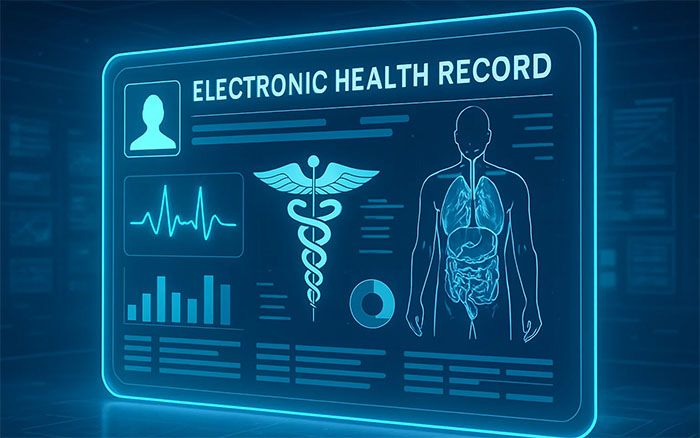The Inside Scoop on EHRs From a Former Nurse
Interview with CJ Pellegrino, Customer Success Manager at Medicat and Former Nurse
When in the market for a new EHR solution, it’s important to ensure that the system you’re choosing is user-friendly and in the best interest of your staff members who will be using the software day in and day out. What better way to find out what features of an EHR are most helpful for nurses than asking a former nurse themself?
One of our Customer Success Managers, CJ Pellegrino, is a former nurse. They sat down with us to spill the inside scoop on their previous roles and experience with EHRs in the Q&A below.
CJ’s experience includes working as an intellectual and developmental disability (IDD) nurse, working in the home hospice care setting, and working at a family practice where their role was focused on practice management and billing. CJ worked with EHRs for many years and provides helpful insights that can be utilized to evaluate an EHR solution. Here’s what they had to say:
1. What kind of EHR did you use in your previous roles? And what features did you use most frequently?
I used several EHRs during my tenure as a nurse. The features I found most important and relevant to my position included those supporting documentation, medication management, and scheduling.
2. How often did you use the EHR?
During my nursing career, I engaged with EHR systems daily across various roles.
- As an IDD nurse, I used the software mid-shift and at the end of each day to manage patient documentation.
- In hospice care, I relied on the EHR after every client visit to ensure accurate and timely records.
- Later, as a clinical administrator, the EHR became a vital tool I used daily to oversee clinic operations effectively.
3. Was the software easy to learn? Was robust training offered?
The EHR provider and the companies I worked for did not offer formal training. Instead, I learned to use the software from coworkers. So my skills and knowledge were limited by what they were able to share with me on the fly.
While I wanted to deepen my understanding of the EHRs, finding relevant resources was a challenge. I discovered prerecorded training videos on the EHR’s website, but they were brief and lacked depth. There were no live trainings, Help Center articles, or other opportunities for hands-on learning. Most of the available resources focused on administrative setup rather than practical guidance for healthcare providers/end users.
4. Do you think using an EHR made your job easier or more difficult?
Using an EHR is undeniably more convenient than traditional paper-based methods. It saves time by allowing for quick electronic data entry and significantly reduces the risk of losing, misplacing, or incorrectly recording information.
However, without proper training, the learning curve can be steep. With adequate training and support, though, anyone can learn how to use an EHR and leverage it to improve their workflow and how they provide care. It’s just a matter of having the right support in place to help you get there.
5. What are the top three pain points for nurses that you think a good EHR can solve?
- Templatizing Documentation: If an EHR has the ability to create templates and standard notes, this is a HUGE time-saver when it comes to complex documentation. Documentation is a big part of a nurse’s job, and templates in a good EHR can make the process way more efficient.
- The Ability to Interface: Having all features and integrations streamlined is crucial for keeping things running smoothly. Opening several programs to properly document patients wastes a lot of time, which means less time to focus on quality patient care. A good EHR should have the ability to execute most, if not all, tasks in one program. For example, easily verifying immunizations and lab results within the EHR can be super helpful.
- Ensuring Safety for Patients: Most importantly, a good EHR should promote patient safety. EHRs should offer ongoing training and support so staff and providers are able to use the software properly. It’s easy for patient information to become lost or disorganized if all members using the system are not properly trained on how to use the EHR, which threatens patient safety.
6. What are the best features of Medicat’s EHR that you think would benefit nurses the most?
Templates and the Template Transaction Linker are invaluable tools that save significant time and streamline workflows. Note Favorites also play a crucial role in standardizing commonly used note types, ensuring consistency and efficiency.
Additionally, fully leveraging the patient portal is essential. Reflecting on my previous nursing experience, we didn’t utilize the patient portal, and now I see how transformative it could have been for both patients and staff. This highlights just how impactful proper training and support can be in maximizing an EHR’s potential and enhancing overall productivity for healthcare teams.
Key Takeaways:
EHRs play a significant role in the workflow of your clinic. When staff members (especially nurses) are working with an EHR they find user-friendly and streamlined, they’re able to work much more efficiently. More patients can be seen, time will be saved, and care quality will improve.
At Medicat, we’re committed to providing you with top-of-the-line support. We have a team dedicated to assist you with any questions that may arise while using the EHR. Our team also offers regular training sessions and webinars, so you’re never left in the dark.













